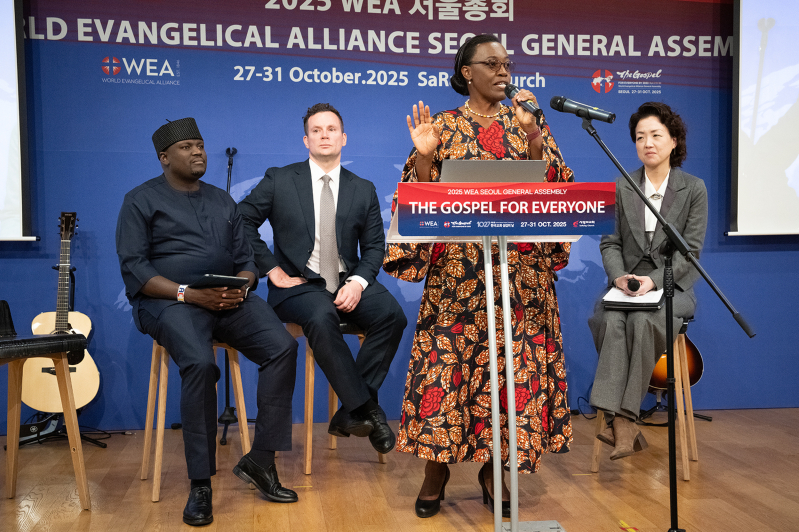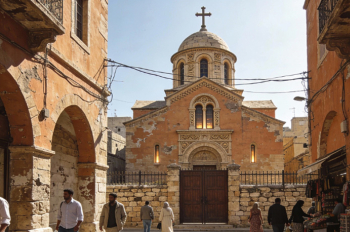
The first panel discussion of the World Evangelical Alliance (WEA) General Assembly, held Monday morning, Oct. 27, at Sarang Church in Seoul, explored the rapid growth and shifting demographics of global evangelicalism, with a particular focus on the African context.
The session, titled “Living the Gospel in Global Growth,” brought together three speakers: Jayson Mandrick, editor of Operation World; Dr. Wanjiru Gitau, Assistant Professor of Practical Theology and World Christianity at Palm Beach Atlantic University; and Dr. David Tarus, Executive Director of the Association for Christian Theological Education in Africa (ACTEA), representing the Association of Evangelicals in Africa (AEA).
Global evangelical expansion
Mandryk opened the panel with a data-driven overview of global evangelical growth, describing evangelicals as a “good news people” who now number more than 650 million worldwide — roughly one-quarter of all Christians. “Evangelicalism has been growing faster than general population growth throughout its history,” he said. “By 1960, evangelicals were only 8 percent of all Christians; today, we are more than 25 percent.”
He noted that the center of evangelical Christianity has long shifted toward the Global South, where 70 percent of evangelicals now live — mainly in Africa, Asia, and Latin America. “We’ve been a majority-world movement for an entire generation,” Mandryk said. “Since 1980, evangelicalism has been predominantly African, Asian, and Latin American.”
Africa alone, he added, is expected to account for nearly 70 percent of all Christian population growth between 2020 and 2070. “The future of Christianity is already here,” he said. “The idea of Christianity as a Western religion is quickly disappearing in the rearview mirror.”
While celebrating this growth, Mandryk also urged reflection. “The question,” he said, “is whether evangelicalism looks and acts according to these demographic realities or is still led by the vestiges of the past.” He underscored that the movement’s greatest challenge is discipleship and leadership development to match the speed of expansion.
Mandrick also addressed evangelical diversity — geographically, ethnically, and denominationally — noting that the movement includes 143 national alliances and countless networks across traditions. “No single denomination owns the good news,” he said. “Our differences can strengthen us if we grapple together in unity.”
Yet he acknowledged that evangelicals face credibility challenges as well. “We have failed to live up to the gospel we preach,” he said. “Our testimony has been marred by scandal and hypocrisy, and in some places the term evangelical has become one of derision. Lord, have mercy.”
“But there is good news because evangelicals are in the end, good news people that is at the very root of our identity. It's right there in the name,” Mandryk concluded. “It's the gospel of Jesus that saves us and saves all others who believe it. And that is the story that we are meant to live. That is the gospel that we celebrate together.”
Africa’s demographic transformation
Following Mandrick, Dr. Wanjiru Gitau turned the discussion toward Africa’s role in the future of the global Church. Her presentation described the sweeping demographic, social, and spiritual changes underway across the continent.
“There is a new scramble for Africa,” she said, noting that nations from Asia, Europe, and the Americas are increasingly drawn to Africa’s resources and potential. “The population is predominantly young — over 50 percent are under 20 — and that brings both a challenge and an opportunity.”
Gitau identified three defining features of Africa’s transformation: explosive population growth, an increasingly educated and upwardly mobile middle class, and a globally connected citizenry shaped by technology and migration. “Africa is no longer socially or culturally left behind,” she said. “It is a continent on the move — rich with untapped human and natural potential.”
Quoting Psalm 68:31 and 1 Samuel 2:5, she connected these demographic shifts to the spiritual awakening taking place across Africa. “Ethiopia — representing Africa — will stretch out her hands to God,” she said. “The continent that once was dismissed as barren is now bearing fruit.”
Gitau highlighted that pastors and Christian marketplace leaders are among the most trusted figures in African societies, often filling gaps left by political instability. “Pastors and Christian leaders are the most trusted leaders on the continent,” she said. “They provide stability and hope where civic leadership fails.”
Concluding her remarks, she outlined three priorities for Africa’s future: engaging existing churches and ministries rather than starting new ones, partnering with faith-inspired communities focused on social transformation, and investing in high-quality education.
“We must engage the networks already practicing incarnational ministry,” she said, “and invest in education — theological or otherwise — that is imbued with Christian hope.”
Training the next generation
Dr. David Tarus concluded the panel by addressing one of the continent’s most pressing needs — theological training for its rapidly growing number of pastors. Presenting findings from research commissioned by the AEA, Tarus reported that an estimated 90 percent of pastors in Africa lack formal theological education.
“The African church is growing fast, but discipleship and leadership development are not keeping pace,” he said. “Our study found that 79.5 percent of pastors have not attained a bachelor’s degree in biblical or theological studies.”
Financial constraints were identified as the greatest barrier, affecting nearly 88 percent of those surveyed, followed by limited access to quality theological institutions and lack of time.
“The four-year, formal, residential model of theological education cannot meet the scale of the need,” Tarus said. “We must find accessible, affordable, and contextual approaches — taking theological education to where people live and serve.”
As Executive Director of ACTEA, Tarus said he has seen creative solutions emerging as universities and churches collaborate to design flexible, local training models. “We need to equip leaders in the local church, not wait for them to come to us,” he said. “People like my father — a faithful pastor who never had formal training — deserve the opportunity to be equipped.”
Tarus emphasized that without strong foundations in Scripture and sound theology, the church’s growth could be undermined by shallow teaching or false doctrines. “Theological health is directly tied to the health of the church,” he said. “This is not just an African issue — it is a challenge for the global evangelical family.”
Click here for CDI's full reporting from the WEA General Assembly.






